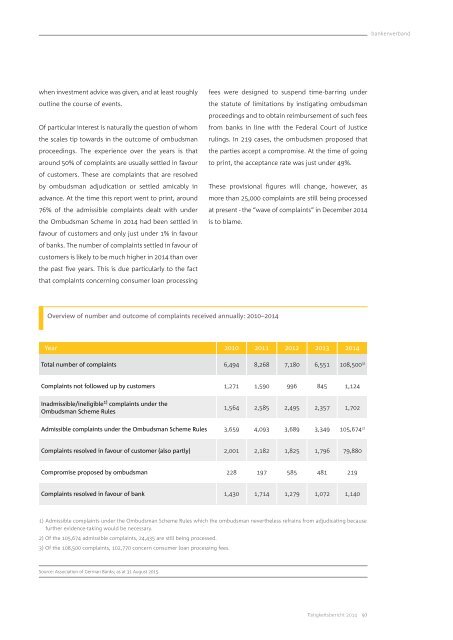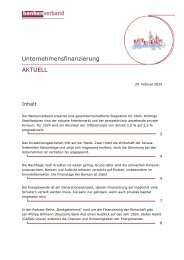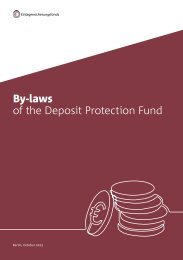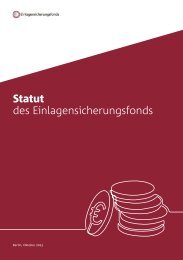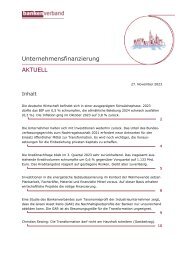Ombudsmann-Tätigkeitsbericht 2014 Englisch
To settle disputes between banks and their customers as quickly and smoothly as possible, Germany's private commercial banks introduced an out-of-court conciliation procedure as early as 1992: the Ombudsman Scheme. The Ombudsman Scheme is the centrepiece of the private commercial banks overall consumer policy scheme, which rests on four pillars: consumer education, consumer information, contract transparency and out-of-court dispute-resolution facilities.
To settle disputes between banks and their customers as quickly and smoothly as possible, Germany's private commercial banks introduced an out-of-court conciliation procedure as early as 1992: the Ombudsman Scheme. The Ombudsman Scheme is the centrepiece of the private commercial banks overall consumer policy scheme, which rests on four pillars: consumer education, consumer information, contract transparency and out-of-court dispute-resolution facilities.
You also want an ePaper? Increase the reach of your titles
YUMPU automatically turns print PDFs into web optimized ePapers that Google loves.
ankenverband<br />
when investment advice was given, and at least roughly<br />
outline the course of events.<br />
Of particular interest is naturally the question of whom<br />
the scales tip towards in the outcome of ombudsman<br />
proceedings. The experience over the years is that<br />
around 50% of complaints are usually settled in favour<br />
of customers. These are complaints that are resolved<br />
by ombudsman adjudication or settled amicably in<br />
advance. At the time this report went to print, around<br />
76% of the admissible complaints dealt with under<br />
the Ombudsman Scheme in <strong>2014</strong> had been settled in<br />
favour of customers and only just under 1% in favour<br />
of banks. The number of complaints settled in favour of<br />
customers is likely to be much higher in <strong>2014</strong> than over<br />
the past five years. This is due particularly to the fact<br />
that complaints concerning consumer loan processing<br />
fees were designed to suspend time-barring under<br />
the statute of limitations by instigating ombudsman<br />
proceedings and to obtain reimbursement of such fees<br />
from banks in line with the Federal Court of Justice<br />
rulings. In 219 cases, the ombudsmen proposed that<br />
the parties accept a compromise. At the time of going<br />
to print, the acceptance rate was just under 49%.<br />
These provisional figures will change, however, as<br />
more than 25,000 complaints are still being processed<br />
at present - the “wave of complaints” in December <strong>2014</strong><br />
is to blame.<br />
Overview of number and outcome of complaints received annually: 2010–<strong>2014</strong><br />
Year 2010 2011 2012 2013 <strong>2014</strong><br />
Total number of complaints 6,494 8,268 7,180 6,551 108,500 3)<br />
Complaints not followed up by customers 1,271 1,590 996 845 1,124<br />
Inadmissible/ineligible 1) complaints under the<br />
Ombudsman Scheme Rules<br />
1,564 2,585 2,495 2,357 1,702<br />
Admissible complaints under the Ombudsman Scheme Rules 3,659 4,093 3,689 3,349 105,674 2)<br />
Complaints resolved in favour of customer (also partly) 2,001 2,182 1,825 1,796 79,880<br />
Compromise proposed by ombudsman 228 197 585 481 219<br />
Complaints resolved in favour of bank 1,430 1,714 1,279 1,072 1,140<br />
1) Admissible complaints under the Ombudsman Scheme Rules which the ombudsman nevertheless refrains from adjudicating because<br />
further evidence-taking would be necessary.<br />
2) Of the 105,674 admissible complaints, 24,435 are still being processed.<br />
3) Of the 108,500 complaints, 102,770 concern consumer loan processing fees.<br />
Source: Association of German Banks; as at 31 August 2015.<br />
<strong>Tätigkeitsbericht</strong> <strong>2014</strong> 97


